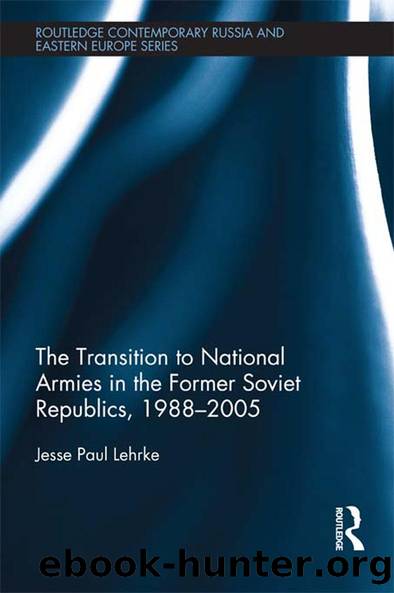The Transition to National Armies in the Former Soviet Republics, 1988-2005 by Jesse Paul Lehrke

Author:Jesse Paul Lehrke [Lehrke, Jesse Paul]
Language: eng
Format: epub
Tags: Social Science, Ethnic Studies, General, Regional Studies
ISBN: 9781135108861
Google: h2DP85Q4czMC
Publisher: Routledge
Published: 2013-01-03T03:41:57+00:00
Perceptions of the regime and opposition
More than during the events examined in Chapter 2, the military's perception of the regime was an important factor during the putsch. This was because of the questions, which had arisen over the past years of decentralization and democratization, over who the regime actually was. While their deployment at first kept the security force occupied with the task at hand, once this initial momentum was lost the regime was required to make an active effort to present a positive image of itself. This attempt failed. First, they used communication media to which many soldiers had little access. While this prevented many soldiers from seeing the GKChP's poor performance at the press conference, it allowed the retelling of stories about the conference to focus exclusively on the image of division, weakness and uncertainty within the GKChP. During the final day the GKChP suffered further setbacks, with the previously excluded CPCC and General Staff refusing to support the GKChP. The GKChP itself also showed signs of fragmenting, although only half of the stories of its division were true. But despite having some control over the mass media, the GKChP could not control street rumours, and while the soldiers had no televisions, they had plenty of citizens with whom to talk.
Unlike during previous events, the regime during the putsch had little to say about the opposition. Instead, the regime focused on presenting the situation in the country as one of impending chaos, collapse and civil war.19 While such a threat seemed to be appropriate given that civil war is one of the worst possible outcomes for the military, and that statements by military officers indicate it was a concern, emphasizing it was a mistake (Boulton and Robinson 1991; Odom 1998: 333; Ottawa Citizen, 21 September 1991). The GKChP was, and had been for the past years, the regime. The dire situation they were presenting was one for which they were largely responsible and therefore their offers of rescue were not credible. They thus raised the problem of civil war, without offering a viable solution â which opened up the space for the opposition to offer themselves as the solution.
Yeltsin's team got off to a good start organizing their base of operations and calling in their supporters, not because of spontaneous innovation and informal networks but because they had planned for this eventuality well in advance. Yeltsin's first actions sought to establish the illegality of the GKChP and the legality of his own government. Through his decrees he threatened to punish for treason those who supported the GKChP while promising authority absolution to those who defected. This contrasted with the behaviour of the regime, which continued to use only threats to motivate the soldiers to obey, while also having a reputation from Tbilisi of punishing even those who did obey. This caused the soldiers to believe they would be punished by the regime whether they defected or repressed, whereas the opposition would punish them only for repression; leaving defection the logical solution to the dilemma.
Download
This site does not store any files on its server. We only index and link to content provided by other sites. Please contact the content providers to delete copyright contents if any and email us, we'll remove relevant links or contents immediately.
The European Opportunity by Felipe Fernández-Armesto(569)
The European History Highway: A Guide to Internet Resources by Dennis A. Trinkle Scott A. Merriman(535)
Morgan Kaufmann Digital Watermarking and Steganography by Ingemar Cox Matthew Miller Jeffrey Bloom Jessica Fridrich Ton(528)
The Seven Wonders of the Ancient World by Michael Denis Higgins(520)
Hyperculture by Byung-Chul Han(509)
European Security in a Global Context by Thierry Tardy(505)
European Security without the Soviet Union by Stuart Croft Phil Williams(503)
The Routledge companion to Christian ethics by D. Stephen Long Rebekah L. Miles(498)
Get Real with Storytime by Julie Dietzel-Glair & Marianne Crandall Follis(443)
Hudud Al-'Alam 'The Regions of the World' - a Persian Geography 372 A.H. (982 AD) by V. V. Minorsky & C. E. Bosworth(436)
Gorbachev And His Generals by William C. Green(428)
Tibetan Studies in Comparative Perspective by Chih-yu Shih Yu-Wen Chen(427)
Governance, Growth and Global Leadership by Espen Moe(417)
How Languages Are Learned 5th Edition by Patsy M Lightbown;Nina Spada; & Nina Spada(406)
CliffsNotes on Fitzgerald's The Great Gatsby by Kate Maurer(399)
The Oxford History of the World by Fernández-Armesto Felipe;(388)
The Egyptian Economy, 1952-2000 by Khalid Ikram(379)
Oral Poetry and Narratives from Central Arabia: The Poetry of Ad-Dindan : A Bedouin Bard in Southern Najd (Studies in Arabic Literature, Vol 17) (English and Arabic Edition) by P. M. Kupershoek P. Marcel Kurpershoek(365)
The Oxford Handbook of the Incas by Sonia Alconini(364)
